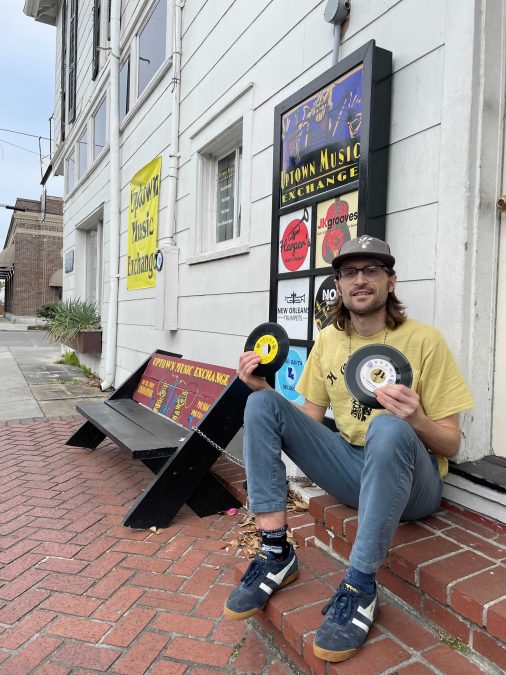
In Living Color
April 5, 2022Seeking Expert Care for Parkinson’s Disease
April 5, 2022In the 1960s, the music industry artists signed to popular record labels like Motown Records, Arista Record, and RCA Victor took the music world by storm. Rhythm and blues, rock, and country grew in popularity, and artists like the Beach Boys, Aretha Franklin, and the Beatles dominated the airwaves. While mainstream artists continue to climb the Billboard charts, history was being made down south in Terrebonne Parish.
Douglas Page is a native of Terrebonne Parish and the owner of Good Earth Records, a New Orleans-based Record Shop that offers music lessons, instrument sales, repairs, CDs, tapes, and vinyl. A disc jockey and lover of music, Douglas moved to New Orleans in 2012, he worked as a live DJ before opening a record store located on Magazine Street amid the 2020 coronavirus shutdowns. “I started the shop here in New Orleans almost two years ago in June 2020, right in the middle of the shutdowns and everything. I decided to do what I love, and it was the only logical move after all the shutdowns happened. I had nothing else to do; I do live DJ gigs and that’s my bread and butter, that’s how I make my money. I do weddings, events, and that was all mixed, so I was able to find the space.”
Ten years ago, Douglas unearthed a piece of music history when he ran across “Houma Records,” a now-defunct record label founded by Anthony Rodrigue. He became intrigued with the sound and decided to learn more about the label. “The project started when I discovered there was a label in Houma years ago. I thought it was awesome and I wanted to find out more about it. I started to look at the names and find out who the guys were and found the label was created by Anthony Rodrigue,” he explained.
Established in 1961, Houma Records was launched by Anthony, a native of Houma and a record store owner. The label produced over 150 songs from various genres including rock’n’ roll, soul, and swamp pop music between 1961 and 1970. “Rhythm and blues and Cajun music had been around for a while so they took the influence from the music they grew up on,” Douglas shared. “The artists on the label were mesmerized by artists like Fats Domino and Little Richard, so they began playing swamp pop music. They had four black artists that recorded blues and soul music which is the most desirable of all of the labels.” The label’s talent lineup featured Houma- and Thibodaux-based artists like Raymond George, and L.J Foret. Sadly, in 1971, the label suffered a tremendous loss after a gas pipe explosion sent its building up in flames.
After months of research, Douglas ran across A.J. “Boudin Man” Rodrigue, the son of Anthony Rodrigue. The two met in person, and Douglas was introduced to A.J. Rodrigue Sr., learning more information from the founder himself. Douglas and A.J. became good friends and began discussing a possible project to reintroduce the music to a new generation. “I met A.J. Rodrigue, locally known as the ‘Boudin Man.’ He became one of my good friends now through this project. We got to talking and I asked, ‘How can we get this music out there?’ We talked about it consistently for years until we figured out a way to make it happen.”
In addition to meeting Anthony Rodrigue, Douglas met Raymond George, one of the four black artists on the label in the 60s. “He was one of the few black artists to record on the label. He’s still getting around, he still picks up the guitar in his late 80s, and he’s just a sweet man. I was able to sit down and talk to him and his family and we talked about his music, his career, and how important he is. Back in the day, they were still dealing with segregation, he was getting asked by white club owners, but he told them he’d only play if they’d let his people in too. He wouldn’t play if it was a white-only crowd.” Douglas was inspired by the conversation and decided to launch a project, taking the music from the archives and bringing it to the forefront.
He decided to begin raising funds to digitize the music and reissue every song from the label’s catalog into a 33 rpm vinyl. Douglas shared his idea with Louis Michot, a member of Michot Melody Makers. Douglas was informed of a grant offered by Threadhead Cultural Foundation and the Jazz Fest Heritage Foundation to help fund his project.
Douglas nervously applied for the proposal and shortly received the call that he would receive a grant of $8,500 from both foundations to reissue the records. Jazz Fest Heritage Foundation and Threadhead Cultural Foundation issue half a million dollars annually to help fund bands, music festivals, and cover studio time. Douglas said he was shocked once receiving the good news, but had no doubt the foundations would understand the significance of this project to the people of Houma. “I was surprised I got it! I knew it was pretty much a guarantee because it’s such a great project and such a great idea. The idea was enough, this label is untouched, and it’s for Houma. The people of Houma have been through so much and need some uplifting after Ida. So helping the project come together I’m sure was a no-brainer for organizations like Threadhead and Jazz Fest,” he explained.
Douglas plans to combine the funds raised independently with the grant to reissue a total of 150 songs on a double LP, an album with two vinyl records, collaborating with Record Press, a New Orleans-based record manufacturing plant. “Luckily we have a great resource in New Orleans called the Record Press. They press new vinyl records 24 hours a day, so we’re going to partner with them and they’re going to make the vinyl records for us.” The project is expected to be completed by the end of the year and Douglas says residents of Terrebonne Parish will be the first to hear the historic music. “Houma will be the first place the music will be, we’re going to host a vinyl record release party. I have a few musicians learning the songs so they can play the tunes live and keep the music going local.”
In addition to a live listening party, Douglas plans to bring the music to the future Houma Band Stand, in hopes of educating residents on the history of our great town and bringing more activities to Houma.
Douglas expressed his passion for the project and his gratitude to Jazz Heritage Foundation and Threadhead Foundation for believing in his vision. “It was a really special thing, they captured a moment in time that was important. That is why I am passionate about this project and getting the music back out there. I thank God we got the grant because it’s going to be a big help and we’re going to be able to get it done quicker. We were raising funds on our own, but the grant was going to help push the project than we were moving.”
Douglas said not only will the reissuing of the music be great for the legacy of the label, but it’s monumental for the cities of Houma and Thibodaux. “This is so important for Houma because back in the 60s, these guys were rock stars. They played in dance halls up and down the bayou from 1960 to 1968. I think reissuing the music now will help keep their legacy alive. That’s why this label is so important, artists like Raymond George were pioneers. They didn’t care about segregation; they were really about perpetuating the culture, producing good music, and keeping it going.”








